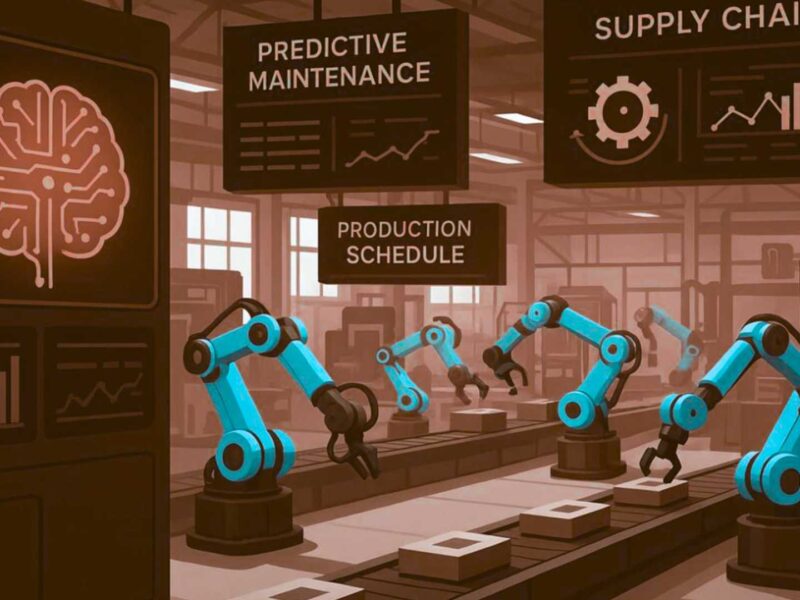Unlocking the Good: What’s the Key to Driving AI for Social Advancement?
AI holds immense potential to transform lives and address pressing societal challenges, from healthcare disparities to climate change and beyond.
But how can we ensure AI is harnessed for social good in a way that prioritizes impact and equity?
In this article, we’ve gathered insights from business leaders, community advocates, and thought visionaries to answer a critical question:
What’s one way to accelerate the use of AI for social good, ensuring it addresses pressing societal needs?
Their responses highlight innovative strategies, collaborative partnerships, and cutting-edge technologies that can amplify AI’s role in creating a better future.
From fostering inclusive data practices to building cross-sector alliances and leveraging open-source platforms, these leaders share actionable ideas to drive meaningful change.
Join us as we explore how AI can be a force for good, tackling global challenges while prioritizing the needs of underserved communities.
Discover the perspectives that are shaping the future of AI for social impact and learn how we can collectively accelerate its potential for a more equitable world.
Read on!
Co-Create AI With Frontline Practitioners
If we want AI to serve the public good—especially in mental health and addiction treatment—we need to stop building it in boardrooms and start co-creating it in the field.
Tech without context is useless, and in some cases, dangerous.
The fastest way to accelerate AI for social good is to get it in the hands of frontline practitioners who understand the human cost of delay, misdiagnosis, or generic treatment.
In my world—running an addiction recovery center—the biggest gap isn’t data, it’s real-time insight. We don’t need AI to write more reports. We need it to flag relapse risk from behavioral patterns, spot gaps in continuity of care, and help overworked clinicians prioritize the right patients at the right time.
One strategy that works? Cross-sector collaboration. We’ve started working with mental health-focused tech groups who are open to being in the trenches—sitting with clinicians, listening to what actually helps, and building tools that integrate into existing workflows, not replace them. The magic isn’t in the algorithm—it’s in how well it respects the human environment it’s trying to serve.
We also need policy support that protects data integrity but doesn’t strangle innovation. AI in healthcare dies in red tape unless regulators and practitioners work together early. Bring behavioral health experts, patients, and AI developers to the same table. That’s where responsible innovation happens.
Bottom line: If AI is going to drive real social good, it has to earn trust where it matters most—on the ground, with people who don’t have the luxury of getting it wrong.
Open Access Puts AI in Problem-Solvers' Hands
Make it open.
The quickest way to accelerate AI for social good is to break it out of the labs and into the hands of the people already solving real problems.
Teachers, healthcare workers, local councils, non-profits. They don’t need hype. They need access, support, and tools that actually work on the ground.
The strategy? Partnerships between tech companies and grassroots organisations. Not just top-down grants, but co-created solutions.
Build with them, not for them. And keep it transparent. Open models, open data, open results. That’s how you scale trust and impact at the same time.

JM Littman
CEO, Webheads
Local Experts Transform AI Into Community Lifelines
A stranded American couple missed their international flight—until our driver made it to the airport from Polanco in 21 minutes flat, navigating roadblocks with real-time AI-assisted routing.
That moment opened my eyes to how AI, when placed in the hands of local experts, can become a tool for social good far beyond logistics. At Mexico-City-Private-Driver.com, we don’t just drive—we act as bridges between cultures, systems, and emergencies. And AI helps us do it faster, safer, and with more compassion.
I believe one powerful way to accelerate the use of AI for social good is to embed it into hyperlocal human networks.
In our case, that means training drivers—many of whom are family breadwinners—with AI-enhanced tools that interpret traffic patterns, air quality alerts, or even civil protests in real time.
These aren’t just routes. They’re lifelines. They help us get patients to hospitals, solo women travelers to safe hotels, and visitors to immigration offices on time—without stress or ambiguity.
By combining open-source models with hyper-contextual data—from Twitter alerts to WhatsApp groups—we’ve created a system that adapts faster than any navigation app alone. It’s not about the tech. It’s about how tech supports trust, in a city that’s often chaotic and overwhelming for newcomers.
To scale this kind of impact, we need partnerships between small operators and larger AI research teams.
Imagine if local driver fleets across Latin America shared anonymized travel and safety data to improve AI fairness or map underrepresented urban zones. The ripple effect would be massive—from safer commutes to more equitable city planning.
In short: AI for social good begins on the ground. And in Mexico City, it often begins in the back seat of a well-driven car.
AI-Powered Alert System Reunites Lost Pets
One idea to help accelerate the use of AI for social good, particularly in addressing animal welfare, is to develop a community-based lost pet alert system powered by AI and real-time technology.
By combining AI-driven image recognition, geolocation data, and crowdsourced updates, this system could drastically improve the speed and success rate of reuniting lost pets with their owners.
For example, when a pet goes missing, an owner could upload a photo and details into an app that uses AI to scan shelter intakes, social media posts, and public camera footage for matches.
The system could also send alerts to nearby users, volunteers, and local animal organizations, creating a real-time network of support.
This kind of tool would be especially impactful in areas where access to traditional resources like microchips or vet records may be limited.
Strategic partnerships between animal shelters, tech developers, and local governments would be key to making this initiative effective and scalable, ensuring AI is used in a way that directly supports the wellbeing of animals and their human families.

Heather Vesely
Social Media Specialist, My Supplement Store
Direct-Care AI Bypasses Traditional Healthcare Gatekeepers
Focus AI development on eliminating healthcare access barriers, just like DPC removes insurance middlemen.
Deploy AI-powered diagnostic tools and telemedicine platforms that connect underserved communities directly with healthcare providers, bypassing traditional gatekeepers.
Partner with DPC practices to create AI systems that prioritize patient outcomes over profit margins—think predictive health analytics that help doctors prevent disease rather than just treat it.
When AI serves patients directly instead of insurance companies, it becomes a powerful force for health equity and accessible care. That’s how DPC brings care back to you.

Wayne Lowry
Founder, Best DPC
Cross-Sector Partnerships Drive Sustainable AI Solutions
I believe that those tech, government, and non-profit partnerships are the key to increasing the use of AI for social good.
One approach is to apply AI-driven applications to tackle such pressing social challenges as climate change, access to medical care, and disparity in education. The convergence of AI and the SDGs can contribute to harnessing the power of AI to create and scale data-driven solutions for global challenges.
For example, AI technologies can be used to improve traffic planning to reduce congestion and emissions, which directly supports environmental sustainability.
At LAXcar, we’re considering additional AI-enhanced tools to maximize our fleets, which are more efficient, both in carbon emissions and gas waste. Working with environmental organizations could help to scale these technologies and make a larger impact on how AI is used to reduce transportation emissions.
To do that and use AI in a way that’s going to truly have a positive impact on the world, I also really believe that transparency and ethical frameworks are necessary.
We need to develop AI systems in an inclusive manner, ones that take into account what society wants and avoid bias. If we built alliances between schools and partners, we could increase AI literacy, develop and train diverse teams, and engage local community members with local issues that can be addressed by AI.

Arsen Misakyan
CEO and Founder, LAXcar
Plug-and-Play AI Tools Empower Nonprofit Impact
One way to accelerate AI for social good:
Give nonprofits plug-and-play access to high-quality AI tools without the enterprise price tag or the learning curve.
Currently, many AI tools are designed for tech teams rather than mission-driven organizations. That’s the bottleneck. The groups doing real work—food banks, clinics, legal aid networks—don’t need a model they have to train. They need prebuilt templates that help them do more with less today.
What would help:
– Partnerships between AI providers and civic tech orgs.
– Templates for use cases like triaging services, automating form fills, or translating legal documents.
– Grant-backed sandboxes where nonprofits can test AI without risking compliance or budget
Bottom line:
If we want AI to solve real problems, we need to stop thinking of it as a research toy and start packaging it like a wrench. Make it simple, useful, and available to the people fixing what’s broken. That’s how impact scales.

James Shaffer
Managing Director, Insurance Panda
Domain Experts Plus AI Teams Create Impact
One way to accelerate AI for social good is by building collaborations between domain experts and AI teams.
When those working directly with real-world problems—like healthcare workers, educators, or emergency responders—collaborate with AI specialists, solutions become more grounded and practical.
Open-sourcing relevant models and datasets can also make a big difference. It encourages broader participation and lets smaller teams innovate without heavy upfront investment.
Another effective move is creating shared platforms where organizations can test and refine AI tools in real scenarios—focusing on safety, fairness, and transparency along the way.

Vipul Mehta
Co-Founder & CTO, WeblineGlobal
Community-First AI Delivers Practical Social Solutions
Simple low-cost solutions that start with community pain points are a practical way to accelerate AI for social good. Real impact emerges through strategic collaborations between product teams and on-ground workers who include nonprofits city programs and local educators to create problem-solving tools for daily operational needs.
The simple AI application brought a 30% improvement in delivery efficiency along with reduced family denials within one month. The focused AI application delivered substantial impact which allowed team members to perform their core duties of assisting people.
Strategies That Work: First establish partnerships with domain experts before proceeding. Don’t create solutions independently because collaborative development leads to better results. Social workers and clinic staff and school administrators should receive your direct involvement. Examine the complicated situations which these professionals need to handle.
Organizations should employ open-source tools while using cloud credits as their resources. The combination of basic guidance and Hugging Face and Google Colab and Airtable automations enables organizations to achieve substantial results without needing financial resources or engineering staff.
Design for trust. Data privacy is non-negotiable. The model needs to demonstrate its assistance capabilities instead of replacing human work while maintaining data privacy through anonymization techniques and participant control.
The Bigger Picture: To achieve greater impact organizations need standardized templates that provide easily modifiable starter kits which others can use. A standardized AI starter package that includes practical models and ethical guidelines alongside real examples for food, housing, and education would allow communities to achieve faster progress.
Social good initiatives using AI should begin directly in community settings instead of starting in laboratories. Such programs begin in shelters as well as classrooms and clinics through the efforts of caring teams and technology that maintains their organizational goals.

Raju Dandigam
Engineering Manager, Navan
On behalf of the Techronicler community of readers, we thank these leaders and experts for taking the time to share valuable insights that stem from years of experience and in-depth expertise in their respective niches.
If you wish to showcase your experience and expertise, participate in industry-leading discussions, and add visibility and impact to your personal brand and business, get in touch with the Techronicler team to feature in our fast-growing publication.













